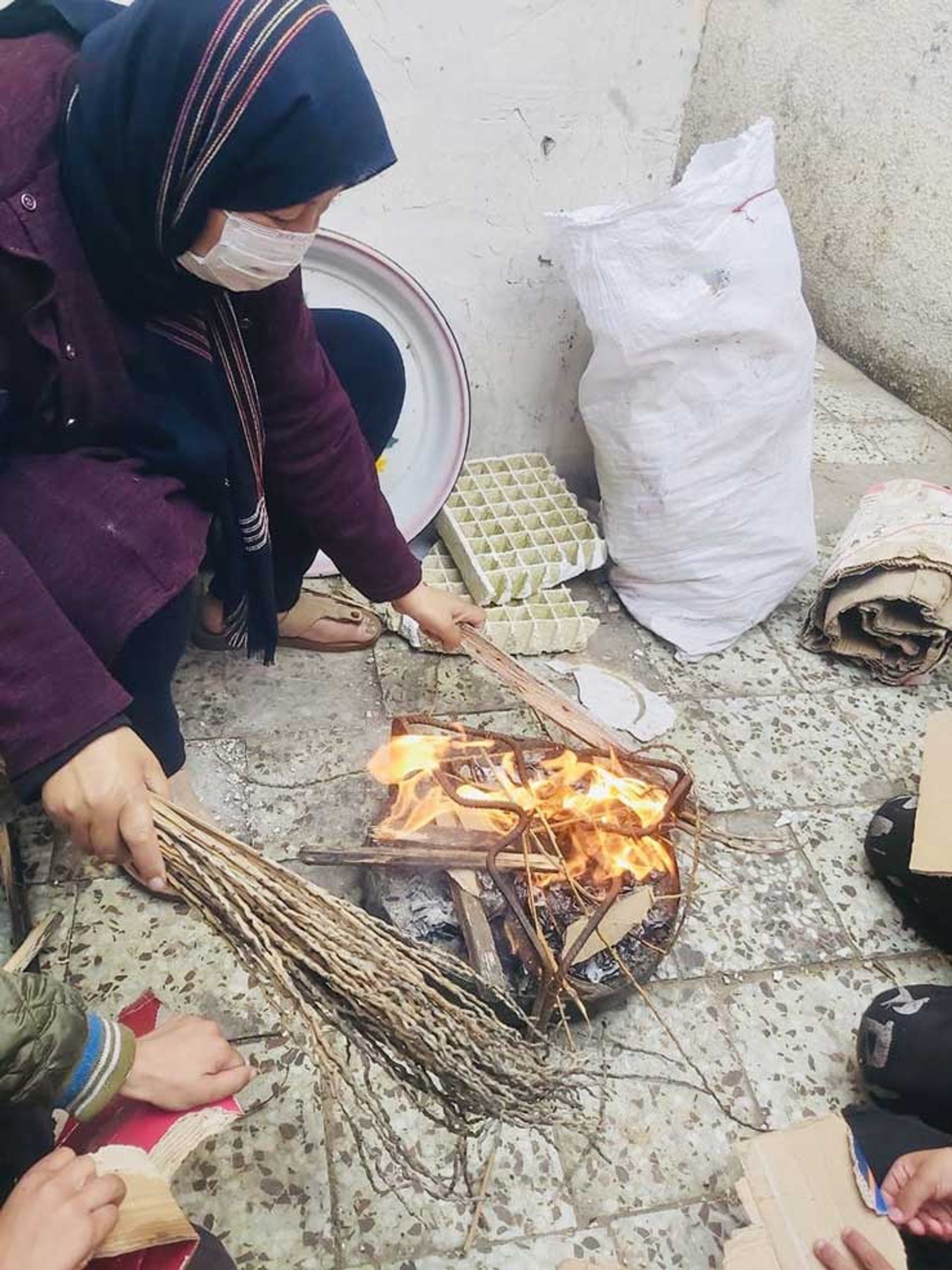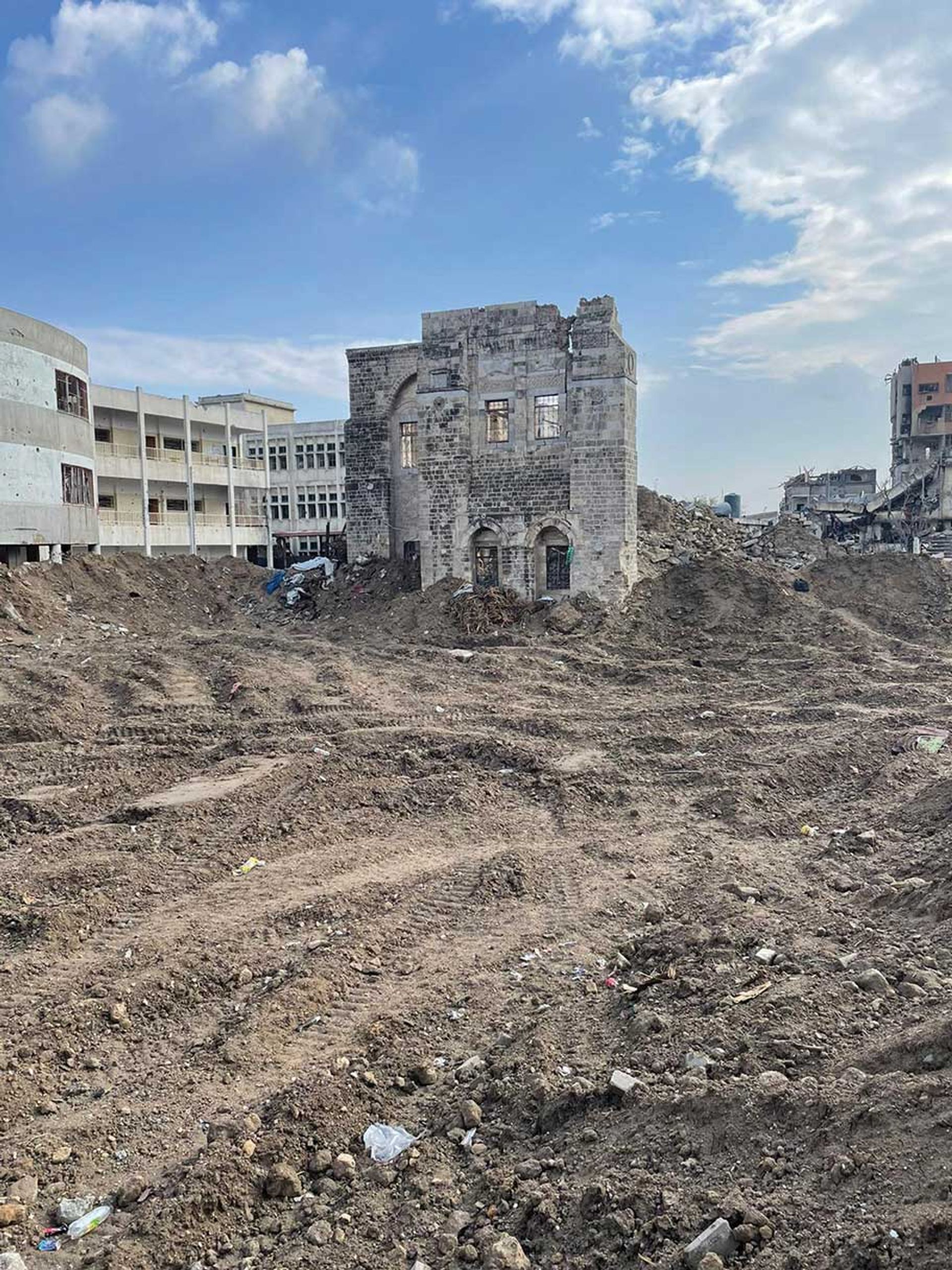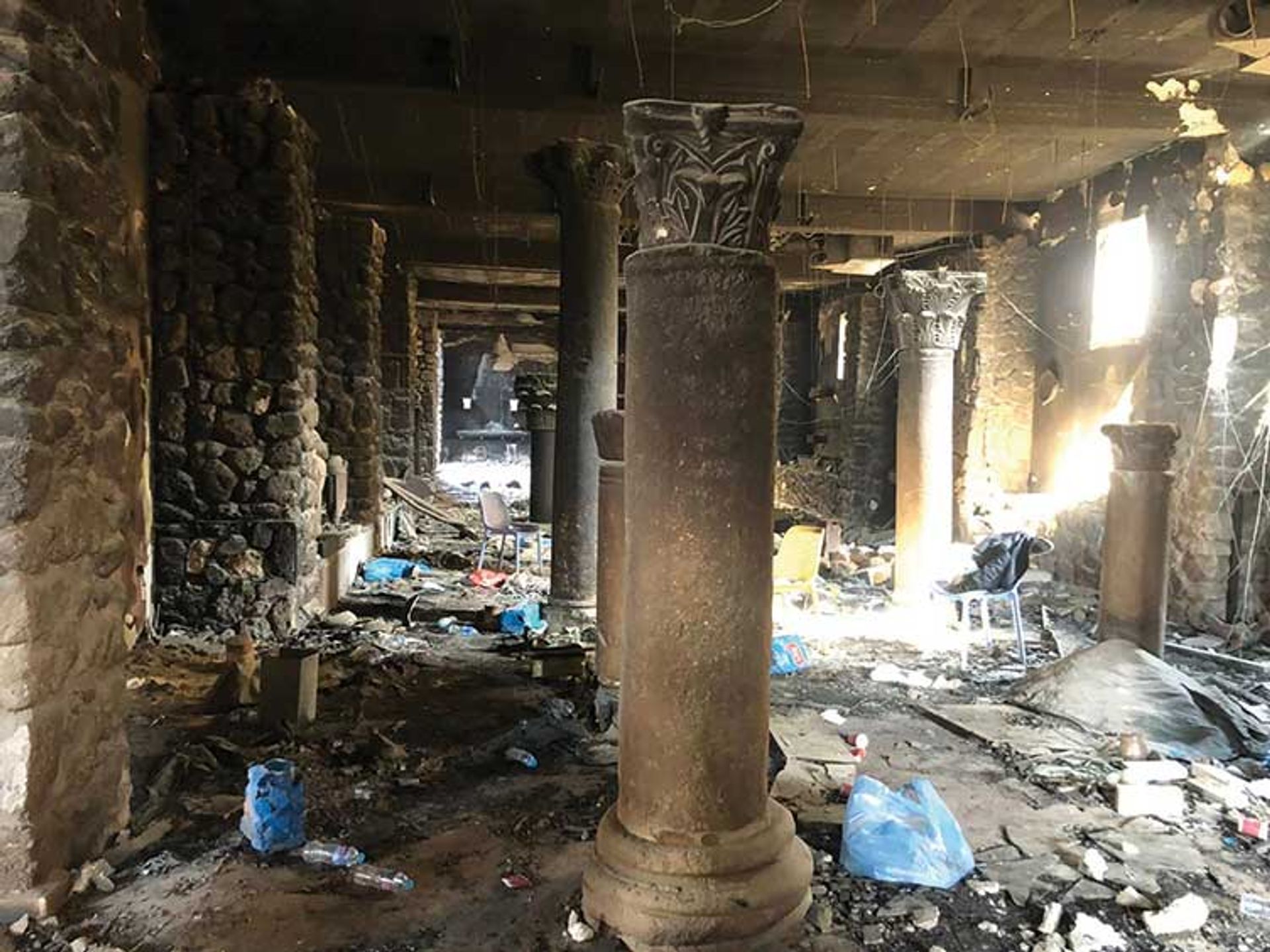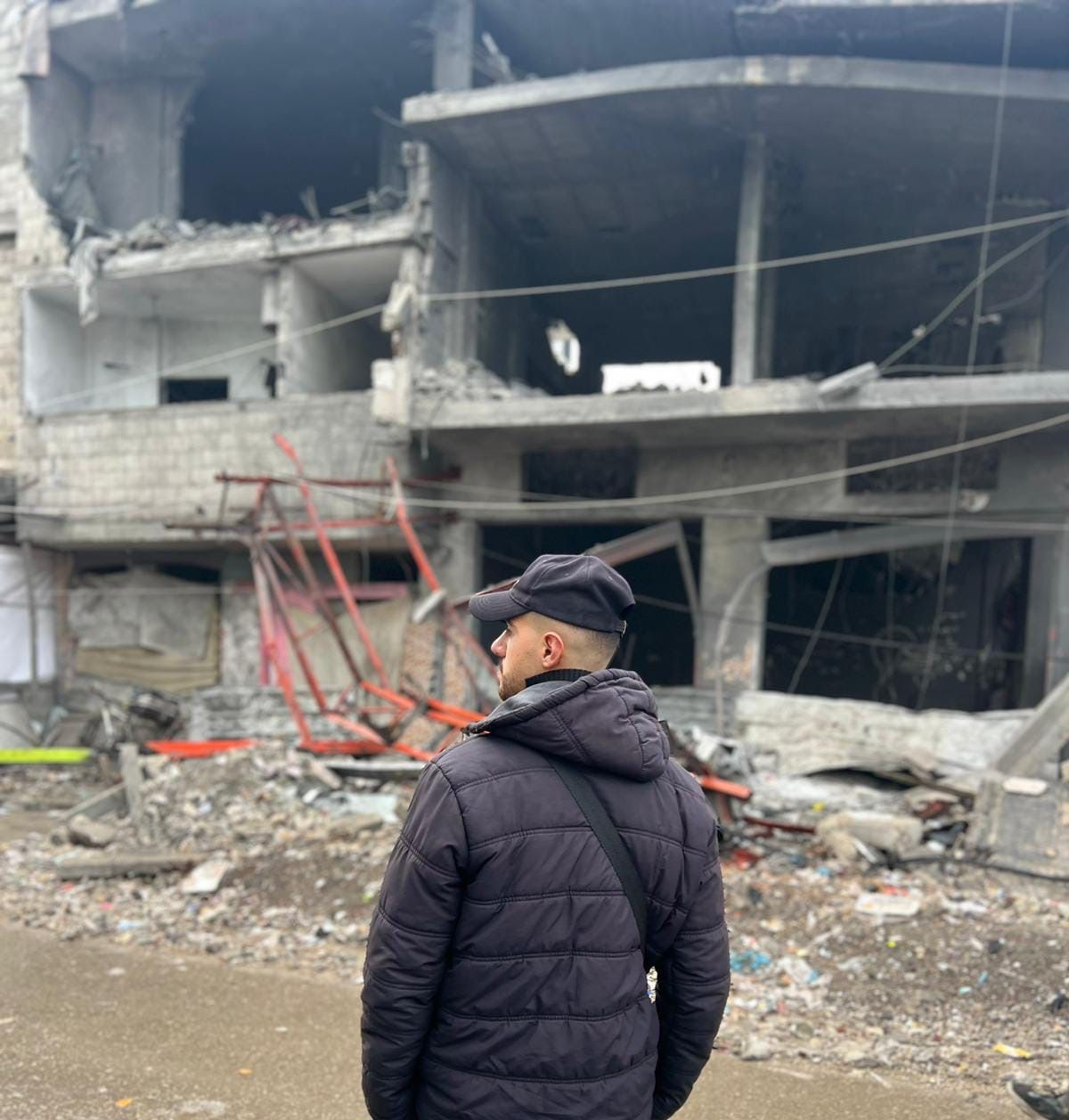In a January report, the Palestinian ministry of culture reported the death of 41 cultural figures who had played a significant role in “elevating and promoting national culture and Palestine’s presence in literary and artistic forums”, as a result of Israel’s military response in Gaza following Hamas’s terror attacks against the country on 7 October. The report also highlighted the substantial damage inflicted on cultural institutions, noting that 19 university facilities, 24 cultural centres and 12 museums have been damaged or destroyed. Before the war, 76 cultural centres and three theatres were registered with the ministry.
We spoke to five culture workers, most of whom have lost their homes and livelihoods, about their extremely challenging circumstances and the uncertain futures they face.
Ayman Hassouna
Archaeologist and university lecturer at the Islamic University of Gaza
Ayman Hassouna was forced to leave Gaza City for Khan Younis, north of Rafah. There, he and 15 family members lived for two months in a cramped apartment before being ordered to evacuate further south to Rafah. Despite the challenges of the journey, which included carrying his immobile elderly mother with his brother, Hassouna made it to Rafah where he now resides with 17 family members in one room. He spends his days looking for firewood and food, which he stresses does not include any type of meat. “Everything is very difficult. It is like a bad dream, and I want to wake up from this nightmare,” he says.
As he continuously coughs, Hassouna says that he and everyone else in his household is ill and unable to see doctors or find basic medication such as paracetamol. He also suffers from a heart condition, high blood pressure and diabetes, all of which require medication that he is unable to obtain. “It is very difficult to live in Gaza. Our voice is not heard, never. Why?” he asks.
Hassouna has dedicated his life to archaeology. From 1995 he spent nearly a decade working on the excavations at Anthedon Port and for years taught at the local university. However, since the outbreak of the war, most of the historic sites he had worked on have been destroyed, he says, and the university, along with his home, were also bombarded and completely destroyed.
Nevertheless, Hassouna speaks with resilience about the future and is already thinking about rebuilding his city. “We have documentation for all the buildings, and we can rebuild them as they were,” he says, but adds that support and funding will be required. “My dream is to do studies on how to rebuild these historical sites and buildings in Gaza because this is a big job.” He is uncertain about the future for his students but hopes he can continue to teach them via Zoom as he had during the Covid-19 lockdowns.

Suhaila Shaheen uses a breadmaker that she saved from her museum
Courtesy Suhaila Shaheen
Suhaila Shaheen
Al Rafah Museum owner and humanitarian and cultural activist
Suhaila Shaheen’s world has regressed more than 70 years into the past. She and her family scour Rafah daily for essentials like clean water, flour, food and wood to burn. With electricity cut off, she now uses the fire-operated iron breadmaker that was once displayed in her museum to make food for her family.
“It has forcibly become part of our livelihood in the present; we have become like desert people living a primitive life,” Shaheen tells The Art Newspaper from Rafah. “Our daily suffering is a struggle to stay alive.”
Shaheen, a Rafah-based activist and a university lecturer with three doctorates in arts, education and technology, spent half of her life dreaming of building a museum in her hometown. That dream finally became a reality in December 2022 when she opened the doors to Al Rafah Museum, with an art collection that included ancient Byzantine and Bedouin artefacts.
But her dream was shattered when the museum was destroyed in October last year in a missile attack, just a few days after the Israel-Hamas war began, and at a time when Rafah was designated a safe zone by the Israel Defence Force (IDF). “The museum was a beacon of training and education for everyone, especially women, to spread the message of science, art, culture and heritage,” Shaheen says. “But the dream I had [worked towards] for more than 30 years is lost. Destroyed in moments.”
She has tried to salvage parts of her collection from the wreckage. “I continue to search in the rubble; perhaps I will find the remains of my museum,” she says. Despite developing chest pains and asthma since the bombardment, the 61-year-old continues to assist the displaced in the city. Her latest initiative is to find a cost-effective way to make tents for those in need, which are scarce due to the difficulty of obtaining them from aid agencies and the high market prices.
Amid the chaos, Shaheen and her relatives—comprised of seven families who nowlive under one roof—face the task of tending to their children’s psychological wellbeing; the nearby bombings, she says, have terrified them to the extent that they are involuntarily urinating and defecating.
“It is like a nightmare of suffering, blood and massacres for a people who dreamed one day of having a homeland like all other homelands,” she says, adding that she does not know if she will be able to work in culture and heritage after the war. “We are waiting for a truce. Hopefully, they will agree. By God, the people are tired, the poor people.”

Al Pasha Palace, the only government-run museum in Gaza
Photo: Fadel Al Utol
Fadel Al Utol
Archaeologist and technical restoration specialist
Fadel Al Utol, a father of five, has for months been living with his family in a tent in Rafah. “Life in Rafah is not much different from other areas in the Gaza Strip,” Al Utol says. “There is not enough food and, if it is found, it is very expensive because farmers are unable to obtain vegetables.”
After the Israeli military ordered civilians to evacuate south, the population of Rafah surged from roughly 250,000 to nearly 1.5 million people. The 42-year-old was working at a 2,000-year-old Roman cemetery in the northwest of Gaza City when the bombing began, prompting him to close the site and rush home, before setting off on his long and treacherous journey to Rafah.
Al Utol began working with the French School of Biblical and Archaeological Research in 1995 and, since 2017, has been part of the Intiqal 2030 workforce, whose mandate is the protection, preservation and promotion of archaeological sites in Gaza. Most of the sites that Al Utol has worked on have been destroyed in this conflict. They include the fifth-century Byzantine Church in Jabaliya; Anthedon Port, which is on Unesco’s Tentative Heritage List; and the Roman cemetery that he shut down.
“Frankly, I did not cry for my house, which was bombed, as much as I cried for the destruction of the Omari Mosque [a seventh-century mosque with Philistine origins], the Pasha Palace [a 13th-century fortress and Gaza’s only government-run museum], and Hamam Al Samra [a 15th-century bath house with Mamluk-era architecture],” Al Utol says. “The world has lost a lot, because the destruction of these cultural sites means the destruction of everything that depends on worldly tolerance.”
In between the relentless search for food in the markets and assisting his other family members, who have also taken refuge in Rafah, he dedicates his time to uplifting his children’s spirits, deeply affected by the harrowing scenes of the war. “I hate violence and I tried to keep my children completely away from it. I didn’t even let them own a plastic gun or watch violent TV programmes,” he says, adding that it is impossible to protect them now from the sounds of gunfire and bombardments. “I woke up this morning to sounds of gunfire,” he says, recounting a distressing incident where two families nearby resorted to violence over a bag of flour.
Desperate for the war to cease, Al Utol yearns to rebuild his life anew. A self-described workaholic with a passion for archaeology he is eager to assess the damage inflicted on the heritage sites he dedicated years to studying and protecting. However, he says the future is very uncertain. “This is all I am thinking about: How long will this war last? Will I return to my work of protecting antiquities? Will financial support for the protection of antiquities continue or will it stop due to the extent of the destruction?”
Al Utol has no answers to his questions and concludes with a simple yet profound desire, “I hope the war stops soon.”
Ali
Final-year history and archaeology student at the Islamic University of Gaza
Ali spent the summer of 2023 working on the Gaza Maritime Archaeology Project run by the University of Southampton and Ulster University in partnership with the University of Oxford, which he describes repeatedly as “one of the most wonderful projects I have participated in in my life”. Ali, who asked to be identified by his first name only, had started his final year at the Islamic University of Gaza studying history and archaeology when the war began.
The 21-year-old’s large family (seven siblings plus his parents) was unable to find a safe place in Rafah when the IDF initially ordered them to leave their home in Khan Younis in December. The night the army entered the city was one of the most terrifying of his life: “The sound of artillery and aerial bombardment did not stop,” he says. “We were in bed…and each of us thought the other was asleep, but no one could sleep that night,” Ali says. “I felt that death was very close and inevitable for us. I recited the Shahada [declaration of faith before death] a thousand times believing that I would certainly die.”
On 5 December the family split up and made their way to Rafah. After taking his mother and younger sister to a relative’s home, where 17 people were now living in a one-bedroom apartment, Ali and his brothers failed to find shelter and were forced to sleep in the street in the rain that night. “That day I felt oppression in my heart, this intense sadness…I asked myself why was all of this happening to me? What did I do to see all this?”. The brothers decided to split up and find shelter at different locations. Ali has been staying with a friend in a room with ten people. He describes dire living conditions: “The water is completely cut off, so we do not bathe for two weeks or more,” he says.
With his university gone he is not sure what the future holds for him. “Our fate is unknown to everyone,” he says. “My dream was to complete my further studies in a European country. I dreamt of Paris, Britain or Canada, because the field of archaeology in these countries is very, very strong. But now my dream is shattered and gone.”
But Ali has not given up. He is trying to escape to Egypt, but the process is lengthy and expensive. He is waiting for his family members in Egypt to setup a GoFundMe page to raise the money he desperately needs to get to safety. “I want my future to be special,” he says. “I want to learn and to complete my education abroad, innovate and excel in my field of work, then return and preserve my country’s heritage.”
By the time of publication Ali has made it to Egypt, leaving his entire family behind to an uncertain fate in Rafah. “I feel like I have abandoned them,” he told The Art Newspaper from Egypt.
A friend in the field of archaeology in the UK is trying to raise money to get the rest of Ali’s family to safety in Egypt. For more information on how to help Ali you can contact the author, or his UK-based friend at andreougm@gmail.com

Al Mat’haf Museum, set up by Jawdat Khoudary
Photo: Jawdat Khoudary
Jawdat Khoudary
Construction company owner, antiquities collector and owner of Al Mat’haf Museum
Jawdat Khoudary spent many years collecting antiquities and preserving heritage. In 2008 the construction mogul, with the agreement of the Palestinian authorities, established Al Mat’haf Museum in a hotel of the same name, on the coast in northern Gaza City. Khoudary says his motivation behind opening what was described as Gaza’s first archaeological museum was simply to preserve artefacts in the absence of any official government. The museum’s collection included Byzantine columns, Roman boat remains, marble inscriptions from Byzantine and Islamic periods, bronze-age pottery and Mamluk and Ottoman marble decorations.
The intensity of the Israeli attacks in northern Gaza forced Khoudary to leave his homeland for Egypt a few days after the war broke out. Due to the location of the museum, which was in the IDF’s ground invasion operation zone, no one could reach it until early February when the army withdrew from the area. The photographs he received from a friend in the immediate aftermath showed his museum and hotel had been destroyed.
His home, which had been in his family since 1960 and was located about 3km from the museum, had also suffered damage, and his meticulously nurtured garden, a labour of love spanning 30 years, had been bulldozed.
Khoudary says precious artefacts are missing from the museum and his office, and the museum was also burnt; the properties were in an area that had been occupied by the IDF. “They broke my heart,” he says. Khoudary has instructed his friends on the ground to secure the site, preserving it as evidence once the war ends.
Not a man who gives up easily, Khoudary says he is waiting for a ceasefire so he can return and start rebuilding. “I am full of dreams,” he says. “Although they destroyed Gaza, I must keep my hopes and dreams to build our city in a more advanced and better way.”


